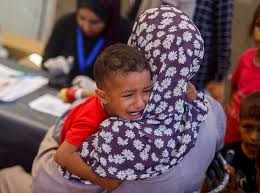
F.P. Report
BRUSSELS: The Ministers of Home Affairs and Justice of Slovenia, representing the Presidency of the Council of the EU, together with the European Commission, represented by the European Commissioners for Home Affairs and for Justice, met on 1-3 December 2021 in Brdo pri Kranju with their counterparts from the Western Balkans at the annual EU-Western Balkans Ministerial Forum on Justice and Home Affairs. The meeting was also attended by representatives of the incoming French and Czech Presidencies of the Council of the EU. The following matters were discussed:
HOME AFFAIRS
Strengthening migration, asylum and border management
The EU and the Western Balkans reaffirmed that migration management is a common challenge that needs to be addressed in close partnerships. Constructive cooperation has already delivered clear results and will be further strengthened, also with the support of EU Justice and Home Affairs agencies. The ministers concurred that efforts to reinforce border management and to intensify regional information exchange remain a top priority. In this context, the EU and the Western Balkans partners agreed to continue their work on developing interoperable systems for identification and registration of mixed migratory flows, as well as National Coordination Centres (NCCs) across the region. The Commission reiterated its readiness to provide technical support.
The ministers exchanged views on the progress made by the Western Balkans in their reception conditions and asylum systems. The need of contingency planning in case of an increase of migratory flows was underlined by the EU. The ministers committed to further strengthen cooperation in the fight against migrant smuggling. The EU underlined also the need to work to enhance return systems, including the conclusion of readmission agreements with key countries of origin. Regional cooperation on return should be reinforced. The ministers agreed that cooperation with EU Justice and Home Affairs agencies will be enhanced. In this context, the remaining Frontex Status Agreements should be concluded without delay.
Countering terrorism, extremism and radicalisation
The ministers agreed that terrorism, extremism and radicalisation continue to pose serious threats to the EU and the Western Balkans. The participants discussed the progress and gaps in the implementation of the Joint Action Plan on counter-terrorism, which remains a key joint framework for the protection of our citizens. The EU and the Western Balkans exchanged views on the current challenges and threats in the region. They highlighted the need to effectively address the issue of returning foreign terrorist fighters, through sharing all relevant information. The ministers reiterated their commitment to prevent radicalisation leading to all forms of extremism and terrorism.
The EU and the Western Balkans exchanged information regarding the evacuated Afghan citizens in transit in the region, including their security screening. The participants agreed that sharing information on this matter will remain essential.
Tackling organised crime
The EU and the Western Balkans reiterated the importance of working together to tackle organised crime, by taking resolute action to fight against smuggling, trafficking of human beings, weapons and the illicit production and trafficking of drugs. The EU underlined that developing Early Warning Systems and National Drug Observatories are prerequisites for efficient policies aimed at reducing both drug demand and drug supply. The early identification of victims is equally crucial to prevent trafficking in human beings and to ensure the referral of victims for further assistance and protection.
The ministers exchanged views on areas where cooperation should be further strengthened to fight cross-border crime. The EU stressed the importance of the participation of the Western Balkans in the new EMPACT cycle 2022-2025. The ministers discussed the steps taken to actively participate in the operational actions under this framework. In this respect, the participants agreed to enhance cooperation with the EU Justice and Home Affairs agencies. The ministers renewed their commitment to the Roadmap for comprehensive small arms and light weapons control in the Western Balkans.
The Presidency presented the outcome of the Ministerial Conference on the prevention and investigation of child sexual abuse, held via videoconference on 12 November 2021. The event underlined the importance of strong international cooperation in the fight against sexual abuse of children both online and offline, and highlighted the importance of preventive action and awareness-raising as well as support for the development of appropriate tools to detect and investigate sexual child abuse.
JUSTICE
Rule of law and judicial reforms
The ministers reiterated the key importance of the rule of law for carrying out reforms, including judicial reforms, and to ensure good governance and the respect for human rights. In this context, the Western Balkans partners outlined the key achievements in the area of rule of law and judicial reform, as well as areas where further progress is needed. They restated their continued commitment to strengthening the rule of law, in particular by continued efforts to ensure the independence, accountability, integrity, quality and efficiency of justice systems. The results of the Western Balkans dashboard project and the regional justice surveys are helpful indicators, which will be taken into account in national policymaking and shaping the reform agenda.
The Commission provided an update on the annual Rule of Law Report for the EU-27 Member States, which is part of the European rule of law mechanism, and on the advancement of two projects for the measurement of the performance of the justice systems of the Western Balkan partners.
Following a presentation by the Commission, the Western Balkan partners demonstrated their readiness to ensure cooperation with the European Public Prosecutor’s Office (EPPO), including on the basis of the notification of the EPPO as a competent authority for the purposes of the relevant MLA Conventions/Treaties, and to support forthcoming negotiations in the Council of Europe on a new legal instrument on the cooperation with the EPPO.
Enhancing judicial training
The ministers acknowledged the importance of enhancing judicial training and the key role of the EU’s support. In this context, the Commission presented the objectives and the state of play of implementation of the judicial training strategy 2021-2024, which is an essential tool to ensure the effective application of EU law, to foster mutual trust among justice professionals in cross-border proceedings and to support the implementation of the EU’s values and principles. The Commission highlighted the role of the Western Balkans in the Strategy and stressed the importance of a more needs-driven approach to EU support for judicial training. The ministers acknowledged the need for better needs identification and long-term ownership and sustainability of training programmes, in particular by securing the lasting involvement of all members of the judiciary, including justice leaders and seniors. It remains necessary to focus first and foremost on building up national capacities for judicial training. Data on judicial training provided through different sources, including the EU questionnaire on judicial training and the Western Balkans dashboard will serve to guide further improvements in this area.
The Commission informed of the upcoming Conference on initial judicial training to be organised under the French Presidency on 22-23 February in Bordeaux and invited Western Balkan partners to actively engage in it.
Digitalisation of justice
The EU and the Western Balkans reaffirmed the importance of digitalisation in order to facilitate access to justice, improve its overall efficiency, and ensure the resilience of justice systems while also strengthening their integrity and accountability. The ministers exchanged on the efforts and challenges of digital transformation, presenting the latest initiatives in this area. The participants discussed the progress made on the establishment and generalised use of the Case Management System (CMS), the random allocation of cases, and the public access to judgments.
The EU reiterated its continued support for further developing digital tools. The ministers agreed on the importance of swiftly addressing the outstanding obstacles to the generalised use of case management systems in view of their full operationalisation. The Western Balkan partners committed to the continued modernisation of their justice systems, with available EU support.
The post EU-Western Balkans: Ministerial Forum on Justice and Home Affairs appeared first on The Frontier Post.






